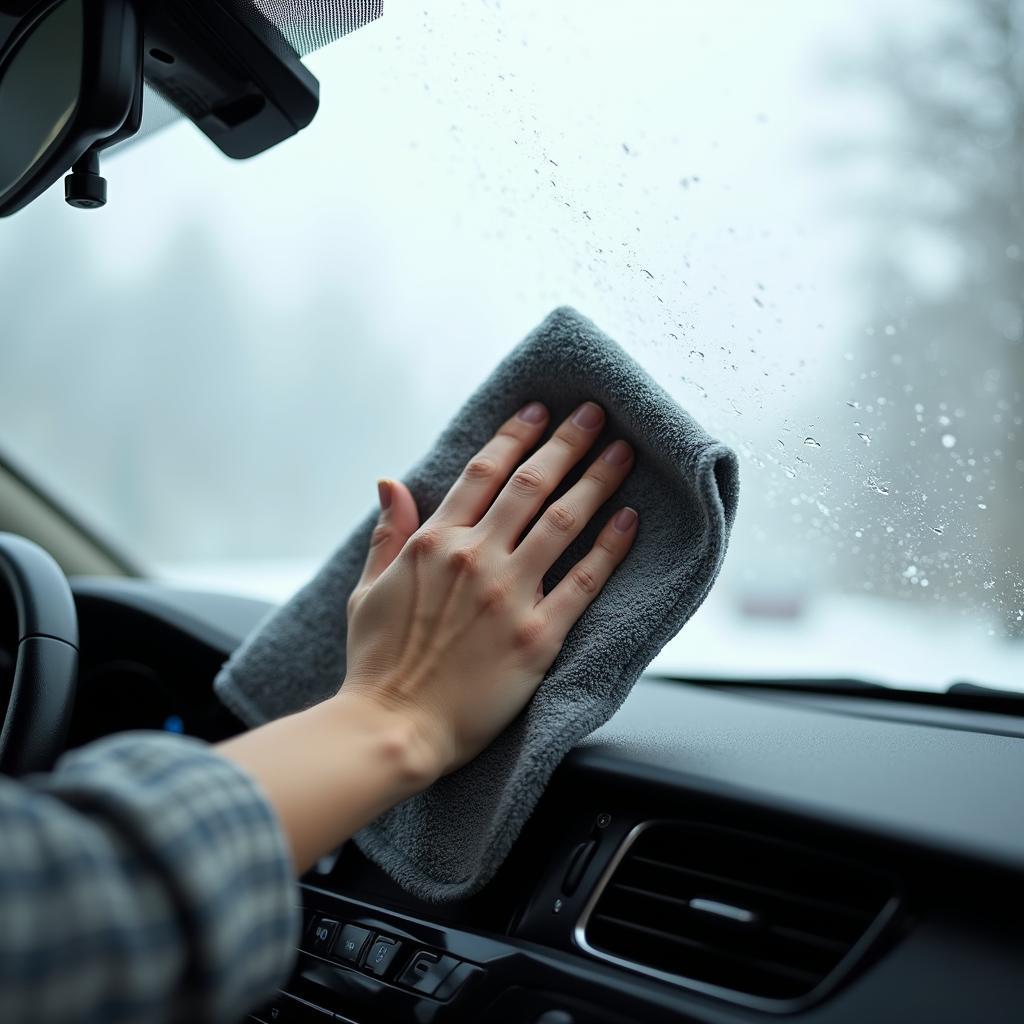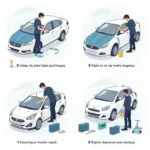Foggy car windows are a common problem, especially during colder months or in humid climates. Not only is a fogged-up windshield annoying, it’s also a serious safety hazard, significantly reducing visibility and increasing the risk of accidents. Fortunately, there are effective ways to defog your car windows and prevent fog from forming in the first place.
Understanding Why Car Windows Fog Up
Before diving into solutions, it’s helpful to understand the science behind foggy windows. Condensation is the culprit, occurring when warm, humid air inside your car meets the cold surface of your windows. The water vapor in the warm air cools rapidly and transitions into tiny water droplets, forming that familiar hazy film. Several factors can contribute to increased humidity inside your car, including:
- Cold weather: The stark temperature difference between your warm car interior and the frigid outdoors is a prime condition for condensation.
- Damp weather: Rainy or humid days naturally increase the moisture content in the air, both inside and outside your vehicle.
- Wet clothes and umbrellas: Bringing wet items into your car introduces additional moisture, making condensation more likely.
- Breathing: Yes, even your breath releases moisture into the air, which can contribute to fogging, particularly when more people are in the car.
Quick Fixes for Foggy Car Windows
If you’re in a hurry and need to defog your windows quickly, here are a few immediate steps you can take:
- Turn on the defroster: Most vehicles have a dedicated defroster setting for the front and rear windshields. Aim the vents towards the windows and turn the fan speed to high to direct dry, warm air onto the glass.
- Turn down the heat: While it may seem counterintuitive, slightly lowering the temperature inside your car can help reduce the temperature difference between the air and your windows, minimizing condensation.
- Crack open the windows: If it’s not too cold or raining heavily, cracking the windows slightly can help to equalize the temperature and humidity levels inside and outside your car.
Long-Term Solutions for Preventing Foggy Windows
While the above methods provide immediate relief, preventing fog from forming in the first place is even better. Consider these proactive measures:
- Keep the windows clean: Regularly cleaning your car windows, inside and out, with a quality glass cleaner and a microfiber cloth removes any residue that can trap moisture and contribute to fogging.
- Use a preventative product: There are specialized anti-fog sprays and wipes available that create a barrier on your windows, repelling moisture and preventing fog from forming.
- Run the air conditioner: Even in colder weather, running your car’s AC, even for a few minutes, can help dry out the air inside your vehicle, reducing humidity and preventing condensation.
- Dehumidify your car: Consider using a small, portable dehumidifier inside your car, especially if you live in a humid climate or frequently encounter foggy window issues. These devices absorb excess moisture from the air.
When to Seek Professional Help
While most cases of foggy car windows can be addressed with the above tips, persistent or severe fogging could indicate a more serious issue:
- Leaking heater core: A malfunctioning heater core can leak coolant into your car’s ventilation system, producing a sweet, musty odor and excessive window fogging. If you notice this, have your vehicle inspected by a qualified mechanic immediately.
- Clogged cabin air filter: A dirty or clogged cabin air filter can restrict airflow and trap moisture inside your car, contributing to fogging. Replacing your cabin air filter regularly can improve airflow and prevent this issue.
Expert Insights from John Miller, Certified Automotive Technician
“Many people underestimate the importance of a clean cabin air filter,” says John Miller, a certified automotive technician with over 20 years of experience. “A dirty filter not only affects air quality but can also lead to increased window fogging. I recommend replacing it every 12,000 miles or as recommended in your owner’s manual.”
Maintaining Clear Vision for Safe Driving
Foggy car windows are more than just an annoyance; they pose a significant risk to your safety on the road. By understanding the causes, implementing preventative measures, and knowing when to seek professional help, you can ensure clear vision and a safer driving experience.
Remember, your safety is paramount. If you’re ever unsure about the condition of your car windows or any aspect of your vehicle’s maintenance, consult a qualified automotive professional for guidance.
FAQs about Foggy Car Window Repair
Q: Can I use shaving cream to prevent foggy windows?
A: While it may seem like an old wives’ tale, applying a thin layer of shaving cream to your windows and wiping it off can temporarily prevent fogging. However, this is not a long-term solution.
Q: Why do my windows fog up more on one side?
A: This could indicate an issue with your car’s ventilation system. One side may not be receiving adequate airflow from the defroster, or there could be a blockage in the vents.
Q: How often should I clean my car windows?
A: Ideally, clean your car windows inside and out at least once a month. More frequent cleaning may be necessary if you live in a dusty or humid environment.
Q: Can I replace my cabin air filter myself?
A: Yes, replacing a cabin air filter is usually a straightforward process. Consult your owner’s manual for the location of the filter and instructions on how to replace it.
Q: What should I do if my windows still fog up excessively after trying these tips?
A: Persistent fogging could signal a more serious issue, such as a leaking heater core. It’s essential to have your vehicle inspected by a qualified mechanic to diagnose and address the problem.
Have other questions related to car repair? Check out our other helpful articles on CarRepairOnline.
For immediate assistance with your car repair needs, feel free to reach out to our 24/7 customer support team via WhatsApp: +1(641)206-8880, or Email: [email protected].



